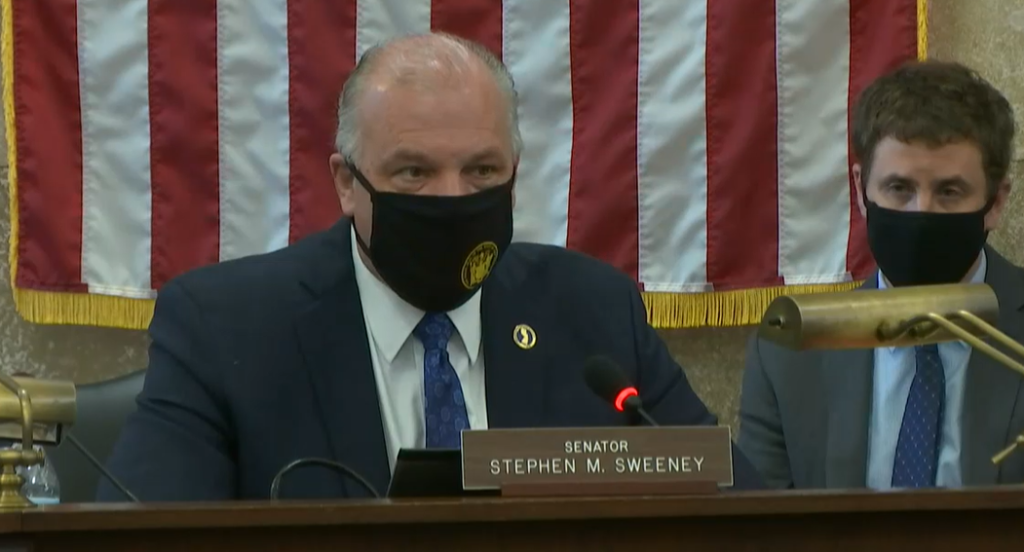Sweeney’s Warehouse Bill – Good Start, But Needs Work

Sweeney’s Warehouse Bill – Good Start, But Needs Work
Senator Sweeney introduced S3688 (Sweeney) today. The bill requires proposed retail warehouse developers to complete a regional economic impact report that considers how neighboring municipalities would be affected by the development.
“New Jersey has a serious problem with warehouse sprawl. We have at least 50 million square feet of warehouse space proposed in the state in environmentally-sensitive areas like the Delaware Bayshore, Highlands, and Pinelands. One of the worst ones is a 5.5 square foot warehouse on Route 1 in West Windsor. Senator Steve Sweeney has put out a new bill to try to help address this problem. This issue is critical considering what is happening across the state, especially when one town tries to build a giant warehouse next to another town,” said Jeff Tittel, Director of the New Jersey Sierra Club. “We had hoped that this legislation would be stronger. There’s a lot of process, but we’re not sure that there will be a lot of outcomes. The state needs the ability to stop these developments to protect sensitive farmland from more truck traffic, more flooding, and more stormwater runoff.”
The bill provides that whenever an application is filed to build a retail warehouse, a municipality would be required to notify and provide a report to adjoining municipalities. The bill then would permit these municipalities to adopt a ‘resolution of intermunicipal concern’, which would then be considered by a joint board with members representing the interests of each municipality.
“This legislation sets up a process and an advisory board. But we’re not sure that the board would have the authority to actually say no to projects. Meanwhile, state permits and other things could still go on. This means that these projects could still bulldoze ahead even with this legislation, paving over some of the last unspoiled areas of the state with warehouses. The Governor really needs to put a freeze on warehouse projects until we can make changes to stop projects,” said Tittel. “The other problem is that only neighboring towns can object to proposed warehouses. However, adjoining towns might be approving their own warehouses or have no objection to the proposed warehouse. Even if a neighboring town has a problem with a proposed warehouse, there is no guarantee that the warehouse can be denied.”
There are multiple ways to strengthen this legislation to use existing authority to address warehouse development, including:
-
Strengthen the role of the advisory council so that it can deny projects.
-
Making the Highlands Council and Pinelands Commission use their existing authority to regulate warehouses.
-
Strengthening the State Plan to prevent warehouse development in Rural Planning Areas (Planning Area 4) and Environmentally Sensitive Planning Areas (Planning Area 5).
-
Amend the Environmental Justice Law (P.L.2020, c.92) so that warehouses and mobile sources aren’t exempt.
-
Give the DEP more authority to turn down projects based on Wastewater Plan Amendments
-
Have DEP use its authority on mobile sources to be able to stop these projects or reduce air pollution.
-
Give the DOT more authority to stop projects based on permits to expand roads, interchanges, or off-ramps, or other improvements.
-
Limiting the amount of truck pollution allowed for warehouse developments and mandating the switch over to electric trucks.
-
Rerouting truck routes and development around schools or overburdened communities.
-
Requiring new warehouses to have solar on roofs and parking lots as well as charging stations for electric trucks.
-
Implementing a trip reduction program to reduce air pollution from mobile sources.
“Right now, this legislation sets up a lot of process without any real substance. They could put more teeth into the bill and give the advisory board clear authority to say no. They could use existing authority that the state isn’t using to stop projects based on air pollution, Wastewater Plan Amendments, and road widening permits. They could also strengthen the State Plan to prevent these projects in Planning Area 4, which is farmland, or environmentally-sensitive Planning Area 5 which includes aquifer recharge and wetland areas and migratory bird grasslands,” said Jeff Tittel. “They should be making the Highlands Council use its existing authority to call up individual projects or comment on whether wastewater plans meet the goals of the Regional Master Plan. We won the Bellemead case, which means that the DEP needs to follow the Highlands Council recommendations for wastewater amendments. This is true in the Pinelands as well.”
The bill will require ‘host’ municipalities to prepare a regional economic impact report. This would look at how the warehouse will capture a share of retail sales in the area, how construction and operation will affect supply and demand for retail space, how the proposed development will impact wages and benefits and demand for employment in the area, a projection of the cost of public services and facilities, a project of public revenues from the proposed warehouse, the effect of increased truck traffic from construction and operation, and how the proposed development impacts local master plans.
“Warehouse projects have serious impacts, especially in overburdened communities. These projects increase truck traffic, which increases air pollution and greenhouse gas emissions in these areas exponentially. The Environmental Justice Law needs to be amended so that warehouses and mobile sources are included. They should make sure that warehouses can’t be built near schools or in areas overburdened by pollution, and that truck routes are routed around these areas,” said Tittel. “New Jersey wants to get to 100% clean trucks and 100% renewable energy. If warehouses are built, they should have limits on air pollution from trucks to encourage electrification. They could also be equipped with EV charging stations and solar on the roof and on parking lots.”
put limits on the amount of air pollution allowed from warehouse truck traffic. This would encourage the use of electric trucks, helping New Jersey get to our goal of 100% clean trucks. They could also make sure that warehouses are built with solar on the roofs.”
The bill also creates the “Intermunicipal Impact Advisory Board” within the Department of Community Affairs. This advisory board would be composed of 15 members who would be appointed within 30 days of the enactment of the bill. The duties of the advisory board would include to promulgate certain guidelines, hear appeals, and render decisions.
“This bill is a first step, but it needs to be strengthened to encourage regional planning and stop bad projects. The advisory board should really take the role of Regional Planning and have the clear authority to say no. We need to be able to stop these projects because they impact critical, sensitive farmland in the middle of South Jersey and the Highlands. These types of large facilities will mean more traffic, more flooding, and more pollution. These projects also increase the towns’ affordable housing obligation, which means even more development and sprawl,” said Jeff Tittel, DIrector of the New Jersey Sierra Club. “Governor Murphy should put a freeze on these damaging projects until these rules and changes can be put in place. The state of New Jersey needs the power to say ‘no’ to protect our state from these warehouses. Otherwise, New Jersey is going to turn from the Garden State to the Warehouse State.”







